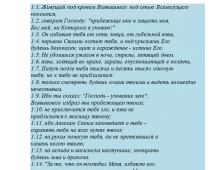Maritime schools of the merchant fleet. Training in higher maritime educational institutions. See what “nautical schools” are in other dictionaries
Maritime higher education institutions are industry-specific universities in which specialists for the Russian civil and military maritime fleet are trained. The list of maritime higher education institutions includes universities, academies and institutes. Universities are training specialists in a wide range of areas related to work in naval structures. Academies train specialists for narrow areas, for example, for service in the country's navy. Institutes train professionals in a limited list of specialties. Maritime universities and academies of the Russian Federation actively conduct not only educational activities, but also scientific work. Many maritime universities offer their graduates opportunities for advanced training in postgraduate and master's programs.
Who can enter higher maritime educational institutions in Russia?
A detailed answer to this question can be obtained from the admissions committee of a particular university. In the most general case, we can say that in order to enter a maritime higher educational institution it is necessary to have a complete secondary general education. Thus, both graduates of secondary general educational institutions and persons who graduated from secondary specialized educational institutions can become students of universities that train specialists for the navy. Some maritime universities in the Russian Federation also accept foreign citizens for training.
Levels of qualifications and areas of training in maritime universities of the Russian Federation
More on the topic:
Currently, maritime universities train both specialists and bachelors and masters. A detailed list of specialties and areas of bachelor's and master's degrees can be found in reference publications or on the websites of universities.
Students who wish to continue their professional growth and engage in science after graduation can enroll in graduate or master's programs.
Duration of study at maritime universities
The length of study depends on the program the applicant will enroll in and the form of study. In the case of full-time specialty training, the duration of training will be 5 years. If you are studying full-time, you will have to study for a bachelor's degree for 4 years. Full-time master's studies will take 2 years.
The duration of distance learning is usually 0.5 - 1 year longer than the duration of full-time study.
List of maritime universities in the Russian Federation
Amur branch of the Federal Budgetary Educational Institution of Higher Professional Education "Maritime State University named after Admiral G.I. Nevelskoy"
Arctic Marine Institute named after V.I. Voronin branch of the Federal State Educational Institution of Higher Professional Education "State Maritime Academy named after Admiral S.O. Makarov" in the city of Arkhangelsk
Arkhangelsk Naval School named after Captain V.I. Voronin - branch of the federal state educational institution of higher professional education "State Maritime Academy named after Admiral S.O. Makarov"
Belomorsk branch of the federal state budgetary educational institution of higher professional education "Petrozavodsk State University"
Belomorsk-Onega branch of the Federal Budgetary Educational Institution of Higher Professional Education "St. Petersburg State University of Water Communications"
Institute of Water Transport named after G.Ya. Sedova - branch of the Federal State Budgetary Educational Institution of Higher Professional Education "State Maritime University named after Admiral F.F. Ushakov"
Caspian branch of the Federal State Budgetary Educational Institution of Higher Professional Education "State Maritime University named after Admiral F.F. Ushakov" in Astrakhan
Crimean branch of the Federal State Budgetary Educational Institution of Higher Professional Education "State Maritime University named after Admiral F.F. Ushakov" - representative office of the Federal State Budgetary Educational Institution of Higher Professional Education "State Maritime University named after Admiral F.F. Ushakov" in Sevastopol
Murmansk branch of the Federal State Educational Institution of Higher Professional Education "State Maritime Academy named after Admiral S.O. Makarov"
Naryan-Mar branch of the state educational institution of higher professional education "Pomeranian State University named after M.V. Lomonosov"
Nakhodka branch of the Federal Budgetary Educational Institution of Higher Professional Education "Maritime State University named after Admiral G.I. Nevelskoy"
Primorsky Institute of Railway Transport - branch of the federal state budgetary educational institution of higher professional education "Far Eastern State Transport University" in Ussuriysk
Primorsky branch of the non-state educational institution of higher professional education of the Central Union of the Russian Federation "Siberian University of Consumer Cooperation"
Primorsky branch of the federal state budgetary educational institution of higher professional education "Russian Academy of National Economy and Public Administration under the President of the Russian Federation"
Sakhalin Higher Maritime School named after T.B. Guzhenko - branch of the Federal Budgetary Educational Institution of Higher Professional Education "Maritime State University named after Admiral G.I. Nevelskoy"
Federal budgetary educational institution of higher professional education "Maritime State University named after Admiral G.I. Nevelskoy"
Federal State Budgetary Educational Institution of Higher Professional Education "Azov-Black Sea State Agricultural Engineering Academy"
Federal State Budgetary Educational Institution of Higher Professional Education "State Maritime University named after Admiral F.F. Ushakov"
Federal State Budgetary Educational Institution of Higher Professional Education "Primorsk State Agricultural Academy"
branch of the federal state autonomous educational institution of higher professional education "Far Eastern Federal University" in the village. Mikhailovka, Primorsky Krai
branch of the Federal State Budgetary Educational Institution of Higher Professional Education "State Maritime University named after Admiral F.F. Ushakov" in Rostov-on-Don
Branch of the Federal State Treasury Military Educational Institution of Higher Professional Education "Military Educational and Scientific Center of the Navy" Naval Academy named after Admiral of the Fleet of the Soviet Union N.G. Kuznetsov" (Vladivostok)
Branch of the Federal State Treasury Military Educational Institution of Higher Professional Education "Military Educational and Scientific Center of the Navy" Naval Academy named after Admiral of the Fleet of the Soviet Union N.G. Kuznetsov" (Kaliningrad)
Private educational institution of higher professional education "Sochi Maritime Institute"
Naval Institute of Radio Electronics named after. A. S. Popova

Popular materials
Maritime College of Sevastopol State University is the oldest educational institution secondary specialized education in Sevastopol. Its history began almost 100 years ago, when in 1921, by the decision of the Crimean People's Commissariat of Education, the Sevastopol People's Polytechnic College was organized in the city.
Among college graduates of different years– Mikhail Fedorovich Kharchenko - commander of the armored train “Zheleznyakov”, which defended Sevastopol in 1941-1942, medical instructor Evgenia Deryugina, a famous scientist in the field of turbine engines, Doctor of Technical Sciences, professor, full member of the New York Academy, who died heroically during the liberation of the city Sciences N.N. Salov, former chief builder of the Sevastopol Marine Plant S.L. Slutsker, Candidate of Economic Sciences, Associate Professor, Head of the Department of Enterprise Economics of Sevastopol State University A.G. Baranov and thousands of other respected specialists who made a significant contribution to the creation and strengthening of the economic and defense power of our country.
Today the Maritime College trains specialists mid-level (technicians) in seven specialties, in the field of navigation, operation of ship power plants, operation of ship electrical equipment and automation equipment, vehicle maintenance and repair, technical operation and maintenance of electrical and electromechanical equipment, finance, as well as programming technicians. The material, educational and laboratory base of the college complies with the Federal State Educational Standards, which was confirmed during licensing and accreditation in 2015. Training at the college is carried out at the expense of the federal budget, and students who do not pass the competition for budget-funded places are trained on a paid basis.
College education involves studying in the first and partially in the second year of the tenth and eleventh grade program of secondary school, as well as receiving in-depth theoretical and extensive practical training in the chosen specialty. All college teachers have higher specialized education, have extensive practical experience and professional teaching skills corresponding to the first and highest categories. A number of disciplines are taught by graduates of graduate school, candidates of science, associate professors. Experienced senior ship mechanics, navigators and sea captains are involved in the training of future sailors.
Director of the Maritime College– Valentina Vladimirovna Manuylenko, Candidate of Pedagogical Sciences.
Specifics of training in college involves the study of interdisciplinary courses that ensure the inextricable unity of theoretical and practical training. Practical training begins in the second year and continues until completion of training. The college has the best training and production workshops in Crimea, allowing students to gain practical skills in a number of working professions during their studies. The main partners of the Maritime College in organizing swimming practice for students of maritime specialties are PJSC "Oceanrybflot" (Petropavlovsk-Kamchatsky), as well as Sevastopol and Crimean fishing, transport, and ship repair enterprises - "Sea Bell", "Southern Maritime Company", "Yuzhmorservice" ", etc. The vessels of these enterprises are the basis for the sailing practice of college students, the successful completion of which provides the opportunity to obtain working maritime documents and further employment in their specialty, with subsequent career growth to the second mate or second engineer inclusive.
College students are more socially and creatively active, participating in sports, military-patriotic and cultural events at various levels - from university to All-Russian. One of the recent significant victories of students of the Maritime College was the second overall team place at the Maritime Universiade 2015, held on May 8, 2015, where adult teams of the most famous maritime higher education institutions in Russia and the world famous sailing ship “Kruzenshtern” were represented.
Currently, the Maritime College trains mid-level specialists in the following specialties of secondary vocational education:
- 02/13/11 - Technical operation and maintenance of electrical and electromechanical equipment (by industry)
NAVIGATING SCHOOLS
NAVIGATING SCHOOLS
Special educational institutions for navigators of the civil fleet in Russia. The first school in Russia to train navigators for Lake Baikal and the Sea of Okhotsk was founded in 1753 in Irkutsk. During the 18th and early 19th centuries. Navigation schools were founded in Kem, Kholmogory, Arkhangelsk and St. Petersburg, but these first M.U. were not successful and were soon abolished. A solid foundation for the development of maritime education was laid only in 1829, when the 1st Merchant Shipping School with a 4-year course was established in St. Petersburg. In 1834, a similar educational institution was opened in Kherson, and in subsequent years in other cities. In 1867, a new regulation was issued on nautical classes.
The classes were divided into 3 categories to prepare for the ranks: 1) coastal navigation navigator; 2) a coastal skipper or long-distance navigator and 3) a long-distance skipper. By 1837, the number of classes in Russia reached 41. In 1902, all nautical classes were closed and in their place, educational institutions were opened within 3 years, consistent with the requirements of the new law of May 6, 1902, according to which navigating ranks are divided into 2 degrees - captain and navigator, and each degree has 4 categories. The nautical educational institutions opened after 1902 were divided into 4 categories: long- and short-distance navigation schools for training to become navigators of the 1st and 2nd categories, and nautical schools for training to become navigators of the 3rd and 4th categories. Two types of schools were established for ship mechanics. In 1909, the system of navigational ranks was simplified, but the system of educational institutions was left unchanged. Samoilov K. I., 1941
Marine Dictionary. - M.-L.: State Naval Publishing House of the NKVMF of the USSR
Nautical schools
special higher (secondary) educational institutions that train civil (merchant) fleet specialists EdwART., 2010
Explanatory Naval Dictionary
Marine Dictionary. - M.-L.: State Naval Publishing House of the NKVMF of the USSR See what "NAITIVATORY SCHOOLS" are in other dictionaries: - NAVIGATING SCHOOL. See Nautical education...
Military encyclopedia Sailing classes - in Russia, educational institutions for training personnel for sea and river transport. They arose according to the Regulations on seaworthy classes (1867). They were under the jurisdiction of the Ministry of Finance. They were preceded by navigation classes founded (1701) by Peter I... ...
Colleges and schools of various types and profiles that train qualified workers; the main link in the system of vocational and technical education (See Vocational and technical education). Before the appearance of a large... ...
Before the introduction of the current regulations on navigational ranks, there were two certified ranks in the merchant fleet: Sh. and navigator. Sh. was called the captain of a merchant ship; assistant navigator and his deputy. By type of navigation these titles... ...
They train specialists for the sea and river fleet of the USSR in navigation, operation of water transport, ship machinery and mechanisms, shipbuilding and ship repair, mechanization of port loading operations, hydraulic engineering construction... ... Great Soviet Encyclopedia
- (Toulon, lat. Tulo Martius) along with Brest, the most significant military harbor of France, a first-class fortress, commercial port, lies inside the deep and safe Gulf of Toulon, separated from the Mediterranean Sea to the west and southwest by the peninsula... ... Encyclopedic Dictionary F.A. Brockhaus and I.A. Ephron
Naval and naval educational institutions of Russia accept young men, citizens of the Russian Federation, starting from 11-14 years old, who have successfully completed the academic year at the time of admission, and who are fit for health reasons to study at schools and serve in the Navy of the country .
You will need
- - a personal statement addressed to the head of the school about the desire to study at this school;
- - autobiography in free form;
- - a copy of the birth certificate;
- - a copy of the passport or document confirming the Russian citizenship of the applicant and his parents (for those living outside the Russian Federation);
- - an extract from the report card with grades for the first three academic quarters of the last year of study, certified by the official seal of the school (the document must indicate the foreign language being studied);
- - medical examination card issued by the military medical commission and certified by the military commissariat (put in the candidate’s personal file);
- - a copy of the medical insurance policy;
- - four photographs measuring 3x4 cm;
- - a certificate indicating the place of residence, living conditions and family composition of the parents (or persons replacing them).
Instructions
Choose the educational institution where you plan to study. There are only a few nautical and naval schools on Russian territory. And the terms of study in them are different, depending on the age at admission. Age categories for those who have completed grades 4, 6, 8 and 11 of secondary schools. Accordingly, the full course of study will be completed over 7, 5, 3 and 2 years.
Since knowledge of English as part of the school curriculum is a prerequisite for admission to naval schools, you need to take this requirement into account. Students who have not studied English are not accepted for training.
Submit an application (report) about your desire to study in the nautical school. Such a report is submitted by parents, or persons replacing them, until May 31. Please note that applications are accepted only through military commissariats at the candidates’ place of residence. The application is submitted to the district or city military commissar. The report must specify the consent of parents (or substitute persons) to send candidates for study at school and further receipts at the disposal of the Ministry of Defense of the Russian Federation. Attach the required documents to the report.
Prepare the necessary documents confirming that you have benefits upon admission. When enrolling, first preference is given to candidates from the preferential category. These include: - minor orphans, or persons without parental care (such candidates are enrolled without passing exams, only based on the results of an interview and the necessary medical examination) - students who have excellent grades in all subjects, awards or certificates of merit " For excellent success" (this category takes only one entrance exam in mathematics (written) - if they receive an excellent grade, they are exempt from further exams, but if they receive grades below 5 points, they will have to take exams on a general basis) - if they receive positive scores on entrance exams - children of military personnel. The conditions for compliance with this category should be clarified in the selected seaworthy school.
If you have qualified, please arrive at school on time, according to the information in the written summons, which indicates the day and time of appearance. Call in school gives the right to obtain the necessary travel documents at the military registration and enlistment offices at the place of residence.
Pass all necessary tests and medical examination. All persons arriving at naval and naval educational institutions undergo professional and psychological selection, testing the level of physical fitness, medical examination and are then allowed to take competitive entrance exams. Candidates who do not meet the conditions of physical fitness, health status and who have not passed professional psychological selection are not allowed to take further exams.
Pass the required exams. Examinations are conducted within the scope of the programs of secondary schools of the Russian Federation. Candidates take written exams in Russian language and mathematics. The factor of strict discipline is important already at the entrance examinations; persons who are late for the exams are not allowed to take the exam.
Prepare to pass the physical education standards. Physical fitness assessment is carried out according to several types. Younger candidates pass the standards for pull-ups on the horizontal bar, and older students, in addition to pull-ups, must pass the 60-meter run and 2000-meter cross-country.
Helpful advice
The most popular among specialized educational institutions with a naval focus is the Nakhimov Naval School in St. Petersburg.



